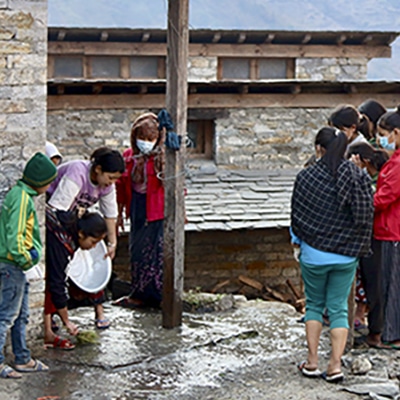
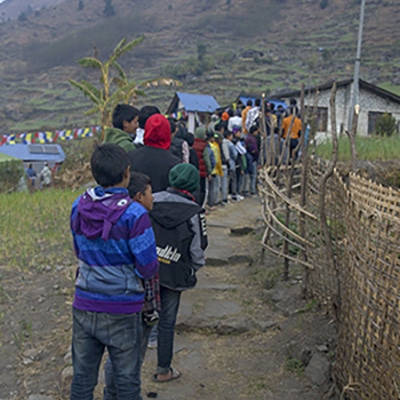
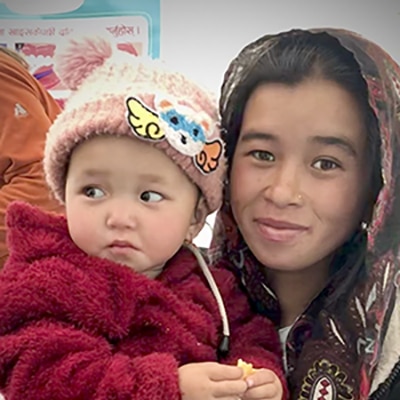
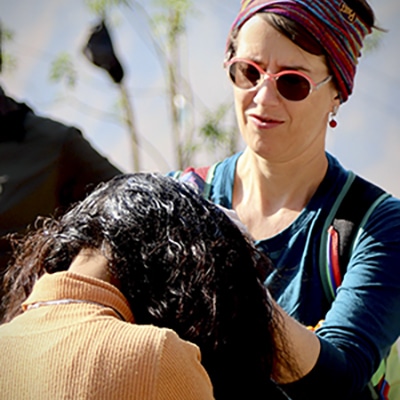
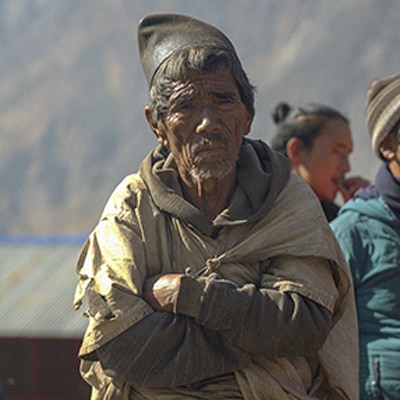
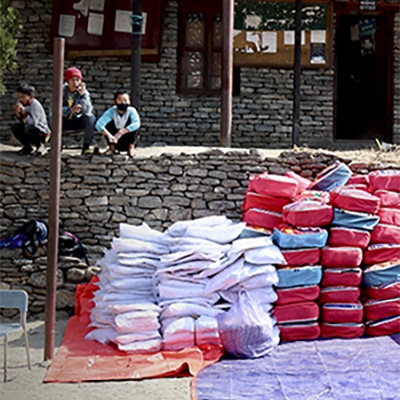
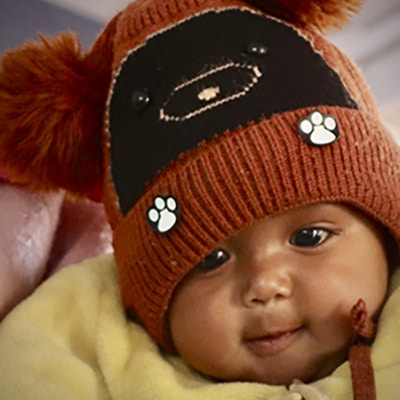
The camp was organized by a team of doctors, nurses, volunteers and other healthcare professionals with the objective of providing free medical services to the people of Phillim and its neighboring communities. The camp was held from 13th February to 16th February 2023 and offered services such as general check-up, ENT, gynecology, fluoride treatment, acupuncture and pharmacy.
The four-day medical camp was a huge success, providing access to basic health services for more than 1,400 patients with 1,800+ cross consultations and treatments. Patients appreciated the opportunity to receive important medical services at no cost. The camp was made possible through the support, hard work and dedication of volunteers and medical professionals.
We hope to continue to provide similar medical camps in the future and to have a positive impact on the health and well-being of underprivileged communities.
For more information, please download the full report using the button below.
The camp was set up in a community health post located in the remote village of Philim, Sirdibas. The organizers had set up several tents and makeshift medical facilities to provide the necessary medical services. The medical team included general practitioners, specialists, acupuncturist, lab technicians, nurses and volunteers who worked tirelessly to provide medical services to the patients. The organizers had arranged for medicines, medical equipment, and other necessary supplies to ensure the smooth functioning of the camp. Supplies were transported to the camp via helicopter.
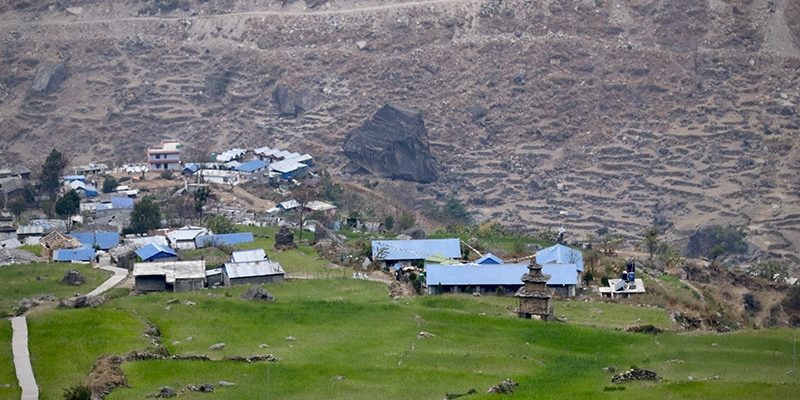
The four-day health camp was well received by the community, and patients started arriving at the camp early in the morning. The camp welcomed around 240 patients on the first day, 280 on the second, 466 on the third and 403 on the fourth and final day. In total, the camp hosted around 1,400 patients with 1,820 cross consultations. The medical team provided services to all patients who visited the camp, and there were no reports of any major medical emergencies during the four-day camp. We learned that some patients traveled two days from remote villages to access services they couldn’t have received otherwise.
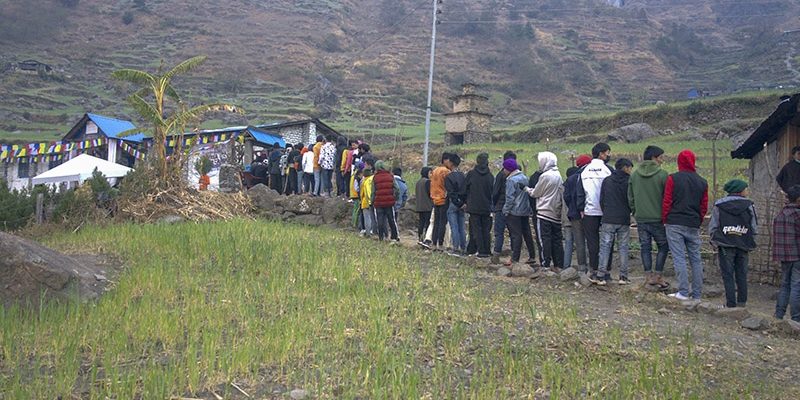
The medical team provided a wide range of medical services, including general health check-ups, consultation and treatment with specialists for ear, nose, throat, gynecology, diagnostic lab tests, acupuncture and pharmacy for medicine distribution. The medical team also provided counseling services on topics such as nutrition, hygiene and family planning. The camp saw a significant number of patients suffering from chronic diseases such as gastritis and hypertension, and the medical team provided them with the necessary medicines and advised them on how to manage their conditions. The team also provided fluoride treatment and hygiene awareness instruction to all the children from Shree Buddha Secondary School, the only secondary community school in the region.
A team of medical professionals, including doctors and nurses, conducted general check-up services. The check-up included measuring the patient’s weight, height, blood pressure and body temperature, as well as performing a comprehensive examination of the patient’s overall health. The team of medical professionals provided advice on lifestyle changes, diet and exercise to the patients.
The key findings suggest that there is a general lack of health and hygiene maintenance amongst the residents, partly due to the lack of health education and awareness, and partly due to the scarcity of medication and resources needed to practice good general health and hygiene.
Unlike other lower settlements, residents in Philim generally have high blood pressure. This could be due to unchecked consumption of alcohol and tobacco potentially due to cultural norms and extremely long, cold winters.


Specialist doctors provided the ear, nose and throat (ENT) services. The service was in high demand, with patients seeking treatment for conditions such as ear infections, sinusitis and tonsillitis. The specialist doctors performed a thorough examination of the patient’s ears, nose, and throat and provided appropriate treatment and advice.
A specialist doctor provided the gynecology service. The service was in high demand, with many women seeking treatment for conditions such as menstrual irregularities, uterine fibroids and pelvic pain. The specialist doctor performed a thorough examination of the patients’ reproductive health and provided appropriate treatment and advice.
Women are particularly at high risk of infection and disease during menstruation due to the lack of sanitary pads and other menstrual resources.
Childbirth in Philim poses huge risks, especially during cesarean births where a lack of medical staff availability and medical infrastructure results in high rates of maternal death. Taking a helicopter for emergency medical situations, such as a complicated cesarean birth, is extremely expensive for the residents and often unreliable due to the weather in the region. In addition, a new law requires a special permit to fly a helicopter to Philim as it’s located in the Manaslu Conservation area. This permitting process has created delays in rescue, unfortunately resulting in death or further complications for the patient.
Due to a lack of available contraceptive options, women often have 4-6 children or more by the age of 35. This, combined with the remoteness, poverty, a harsh climate and lack of education results in parents who are unable to properly address the health needs of their children and themselves.
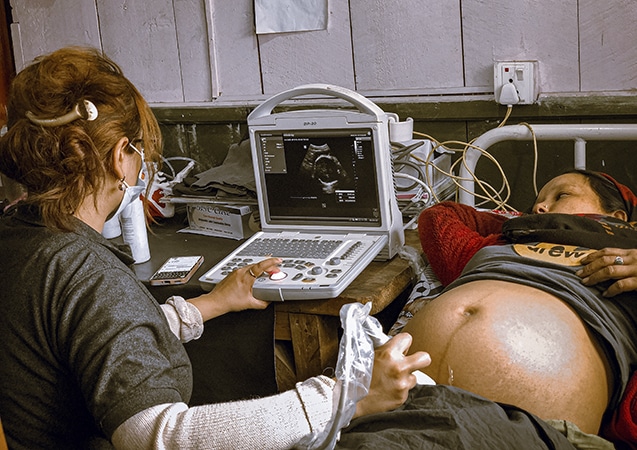
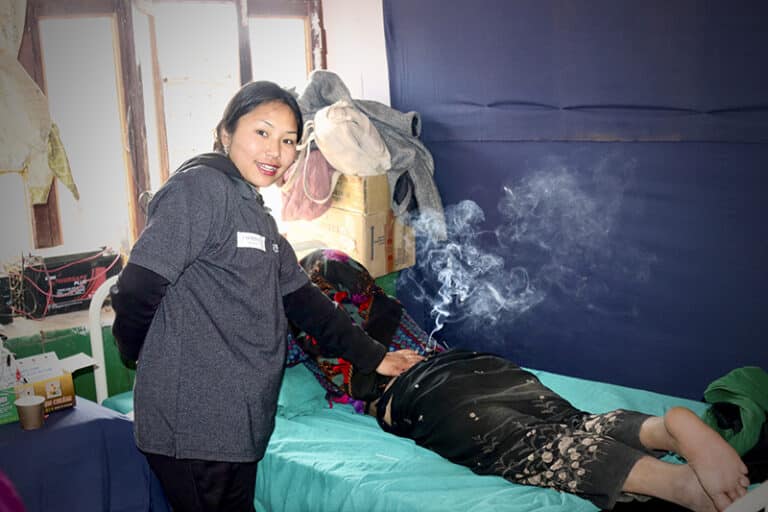
Specialist practitioners provided acupuncture services. Many patients, particularly the elderly, sought relief from conditions such as chronic pain, headaches and anxiety. The specialist practitioners performed the acupuncture treatment, which involved the insertion of fine needles into specific points on the patients’ bodies. They also performed cupping, another ancient form of therapy where special cups are placed on a patient’s skin to create suction. Cupping can help alleviate pain, inflammation and blood flow, in addition to offering deeptissue massage, relaxation and a stronger sense of wellbeing.
Lab tests are an essential part of medical diagnosis and treatment as they provide important insights into a patient’s health status. During the health camp, pathologists completed a total of 127 lab tests to diagnose and treat patients. These tests helped the medical team diagnose and treat various health conditions such as anemia, diabetes, liver and kidney problems as well as high cholesterol.
The samples collected from the patients were analyzed in a laboratory and the results were shared with the medical team. The medical team then used these results to diagnose, treat the patients and provide suggestions if the treatment and medicines weren’t immediately available.
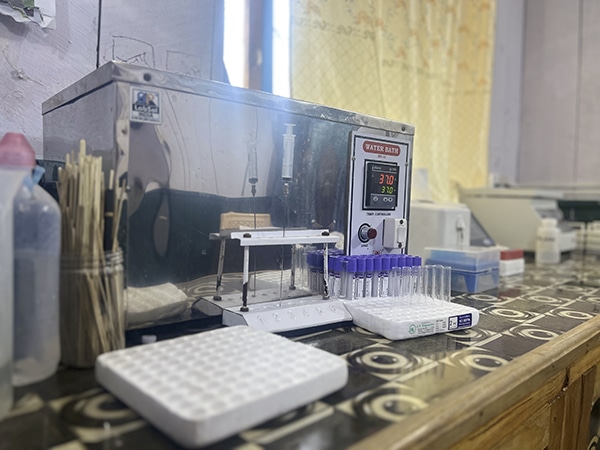
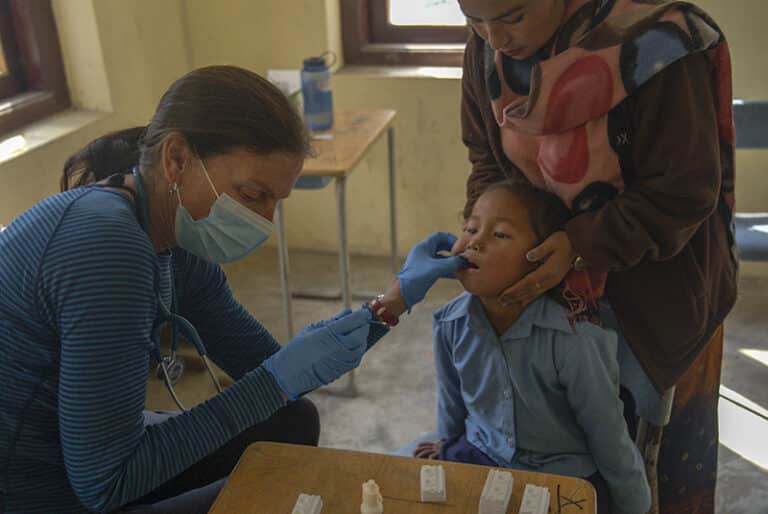
No dental specialists were present, so we did not conduct intensive dental care at the medical camp. However, we were able to provide a general fluoride treatment to more than 200 students who attended the local community school. Each student also received a toothbrush, toothpaste and soap alongside brushing and general hygiene instructions.
There was no ophthalmologist present at the camp, yet we distributed two suitcases full of reading glasses and sunglasses. A total of 93 individuals received glasses and the remaining were donated to the local health post.
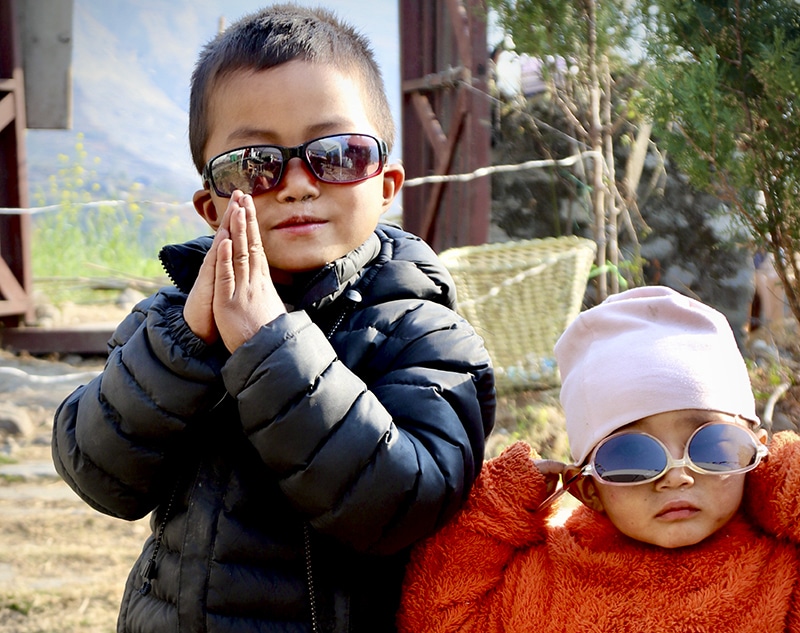
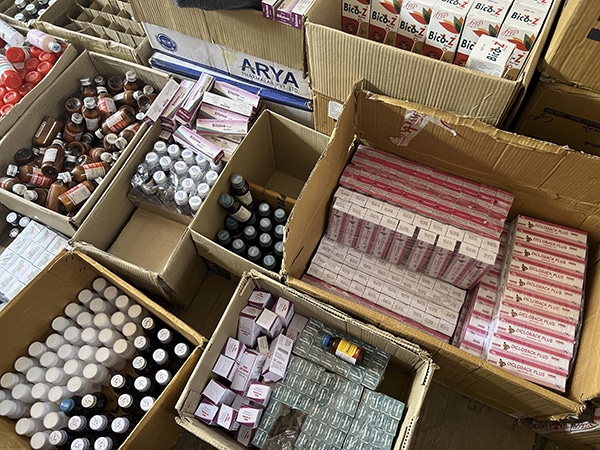
After the consultation and treatment, patients were sent to the pharmacy to collect prescribed medicines before returning home. All medicines were brought in from Kathmandu via helicopter and provided free of cost.
Our team of doctors did a health screening and needs assessment of all 415 students at the local school between the ages of kindergarten and grade 10. Sick children received medicine and care. During the two-day screening, we saw several cases of scabies and lice among children living in the hostel unit. We provided lice and scabies treatment to all 166 kids in the hostel, along with education on personal health and hygiene.
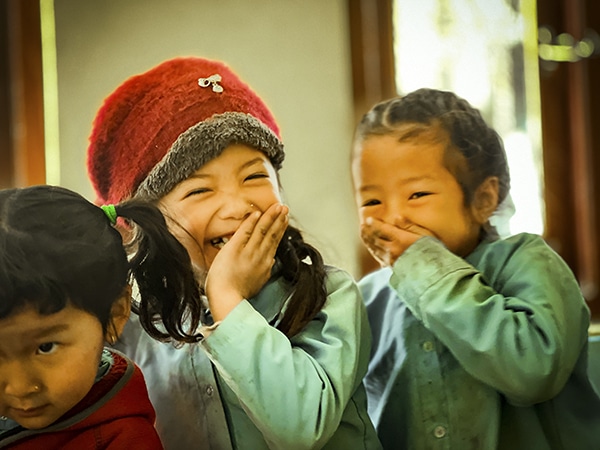
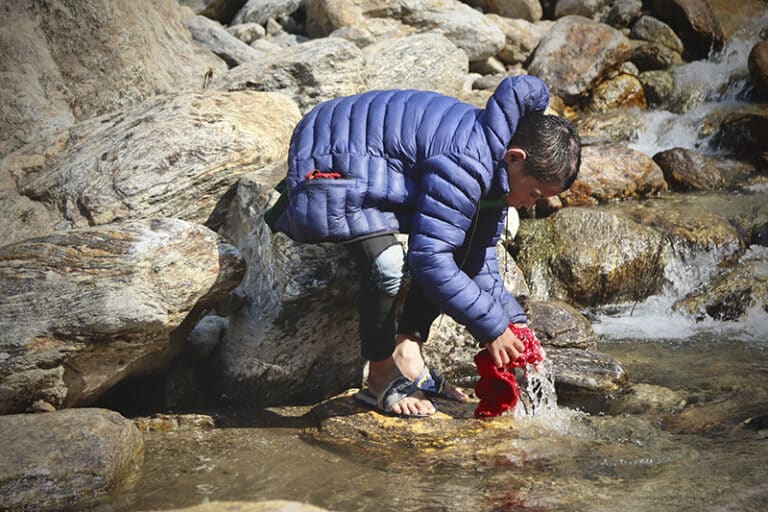
We promoted health and hygiene practices through educational materials distributed at the local health post and school. We placed emphasis on hand washing, tooth brushing and sanitation (proper care of toilets, showers and living spaces). We also organized a full cleaning and sanitation of all eight hostel rooms, toilets and washbasins at the school.
Our team of American and Nepali gynecologists gave a presentation in conjunction with the local women’s group. They discussed menstrual hygiene and period management, along with reproductive health and safe sex practices. 200 reusable menstrual kits were distributed to all girls at the school and women’s group.
The four-day health camp was a huge success. The medical team was able to provide medical services to 1,389 people who would not have had access otherwise. Moreover, the camp offered medical care to patients suffering from a wide range of medical conditions, and the medical team provided the necessary treatment, care and suggestions. Recognizing the lack of medical services in these communities only emphasized the importance of organizing future camps in the region.
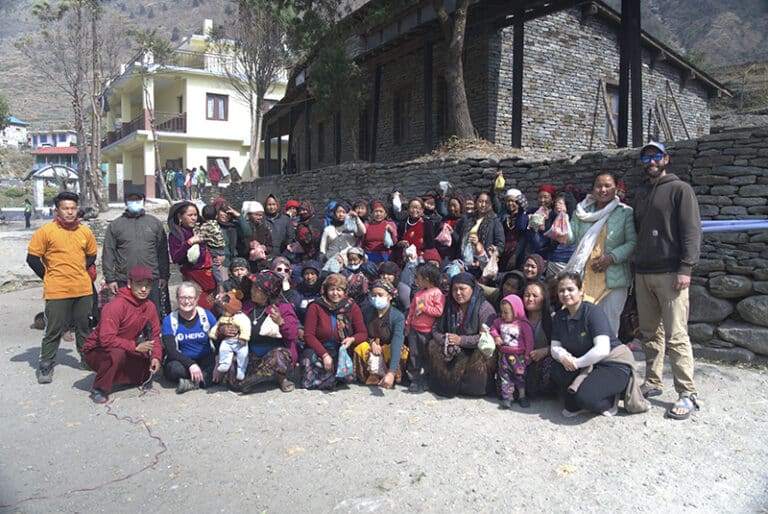
1. There is a general lack of health and hygiene services among the local residents partly due to the lack of health education and awareness, and partly due to the scarcity of medication and resources needed to practice good general health and hygiene.
2. Due to the limited availability of food and the lack of knowledge about proper nutrition, many people in these communities suffer from malnutrition.
3. Due to poor hygiene and sanitation, people in these communities are more prone to 17 developing skin diseases such as scabies, dermatitis and fungal infections. Furthermore, people are at risk of developing parasitic infections such as hookworm, roundworm and tapeworm.
4. Women are particularly at high risk of infection and disease during menstruation due to the lack of sanitary pads and other menstrual resources.
5. Childbirth in Philim poses huge risks, especially during cesarean births where a lack of medical staff availability and medical infrastructure results in high rates of maternal death. Taking a helicopter for emergency medical situations, such as a complicated cesarean birth, is extremely expensive for the residents and often unreliable due to the weather in the region.
6. Due to a lack of availability in contraceptive options, women often have 4-6 children or more by the age of 35. This, combined with the remoteness, poverty, a harsh climate and lack of education results in parents who are unable to properly address the health needs of
their children and themselves.
7. Unlike other lower settlements, residents in Philim here generally have high blood pressure. This could be due to unchecked consumption of alcohol and tobacco potentially due to cultural norms and extremely long, cold winters.
8. Due to the rugged terrain and heavy physical labor required for farming and other activities, people in these communities are more prone to developing musculoskeletal disorders such as arthritis and back pain.
9. Due to the cold and harsh climate, people are more prone to acute respiratory infections such as pneumonia, bronchitis and asthma.
10. Dental hygiene is generally neglected, with most of the population brushing their teeth once a week or less.
11. Due to the lack of access to healthcare facilities, people in the region are more vulnerable to infectious diseases such as tuberculosis, hepatitis B and HIV/AIDS.
12. Due to the isolation, poverty and harsh living conditions, people in these communities are more prone to developing mental health problems such as depression, anxiety and posttraumatic stress disorder (PTSD).
A huge THANK YOU goes out to everyone involved.
To view more details about the 2023 Free Health Camp, please download the full report below.